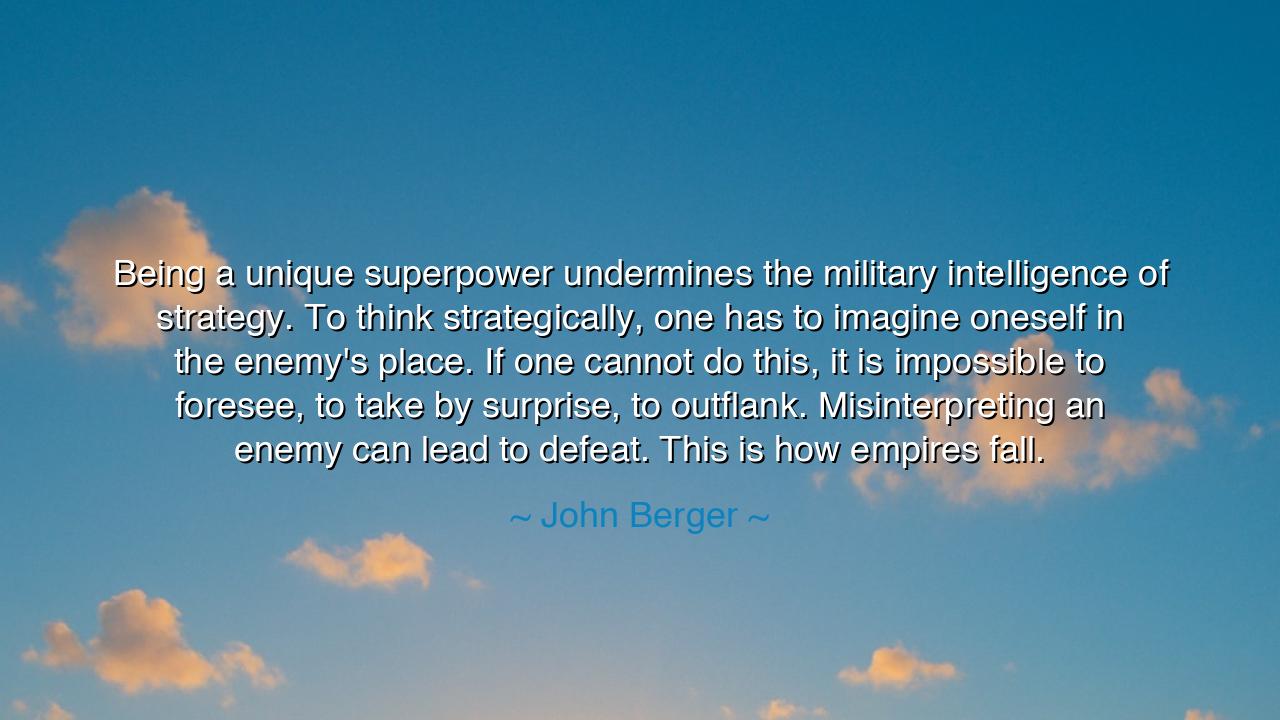
Being a unique superpower undermines the military intelligence of
Being a unique superpower undermines the military intelligence of strategy. To think strategically, one has to imagine oneself in the enemy's place. If one cannot do this, it is impossible to foresee, to take by surprise, to outflank. Misinterpreting an enemy can lead to defeat. This is how empires fall.






The words of John Berger — “Being a unique superpower undermines the military intelligence of strategy. To think strategically, one has to imagine oneself in the enemy's place. If one cannot do this, it is impossible to foresee, to take by surprise, to outflank. Misinterpreting an enemy can lead to defeat. This is how empires fall.” — are not merely a reflection on war, but a meditation on the nature of power, empathy, and understanding. Beneath his observation lies an ancient truth: that arrogance blinds, and that the mightiest fall not from weakness of arms, but from weakness of vision. Berger speaks as a historian of the soul, warning that the moment one believes oneself invincible, the seeds of decline have already been sown.
To be a superpower, in Berger’s sense, is to stand alone in strength — unmatched, unrivaled, and unchallenged. Yet herein lies the paradox: absolute power breeds isolation, and isolation corrupts the art of strategy. For true strategy is not domination, but perception. It is the ability to think as one’s enemy thinks, to move as one’s rival moves, to see the battlefield through every set of eyes. When power grows so great that it ceases to understand opposition, it begins to stumble blindly. It can no longer anticipate or adapt, for it has forgotten the humility of doubt. And so, like a warrior deaf to the footsteps behind him, the empire falls not by force, but by ignorance.
History offers countless echoes of this wisdom. Consider the Roman Empire, which, at the height of its glory, believed itself eternal. Its legions marched across the known world, its banners fluttered from the deserts of Africa to the forests of Germania. But over time, Rome grew complacent. It no longer studied the tactics of its enemies — it dismissed them as barbarians, incapable of strategy. Yet those so-called barbarians learned Rome’s ways, adapted, and turned its arrogance into their weapon. When the Visigoths sacked Rome in 410 AD, it was not just the walls that fell, but the illusion of supremacy. Rome’s true defeat came not from strength of the enemy, but from the blindness of empire.
Berger’s insight applies far beyond the battlefield. In politics, business, even in personal life, the failure to see through another’s eyes is the root of downfall. The ancient Chinese strategist Sun Tzu wrote, “Know yourself and know your enemy, and you will not be defeated in a hundred battles.” Berger, centuries later, reframes this truth for the modern world — that when a power becomes so dominant it no longer studies others, it forgets that every adversary has its own intelligence, its own motivations, its own truth. To misinterpret the nature of another — whether an opposing nation or a rival mind — is to build one’s plans upon sand.
The lesson resonates deeply in our age, where nations wield technology and might so vast that they risk mistaking it for wisdom. The United States, as the world’s foremost superpower in the late twentieth and early twenty-first centuries, has often faced this dilemma. From the quagmire of Vietnam to the long wars in the Middle East, immense power met elusive resistance. The might of machines and money could not substitute for understanding the hearts and minds of those on the other side. The failure to “imagine oneself in the enemy’s place,” as Berger wrote, rendered strategy hollow. Power without empathy became repetition without insight — the same mistake, learned too late, over and over again.
In truth, empires fall not when their armies weaken, but when their vision narrows. The ancient kings who listened only to their own counsel, the generals who dismissed the cunning of their foes, the leaders who saw enemies as lesser beings — all share the same fate. Power intoxicates; it silences curiosity and kills humility. And yet, as Berger reminds us, humility is the foundation of intelligence. Only through empathy can one anticipate; only through understanding can one prevail. The strategist who loses empathy loses foresight, and without foresight, even the greatest empire becomes a giant walking into darkness.
And so, O listener of wisdom, take this teaching to heart: whether you command nations or merely your own destiny, learn to see through the eyes of others. Do not mistake strength for infallibility, nor victory for wisdom. When you face conflict — in life, in work, in love — step first into your opponent’s mind. Ask: What do they see that I do not? What truth lies hidden in their motive? For it is only in seeing the full picture — both yours and theirs — that you can act with clarity. In this way, you will not fall as empires fall, for you will have mastered not domination, but understanding, the highest form of power.






AAdministratorAdministrator
Welcome, honored guests. Please leave a comment, we will respond soon